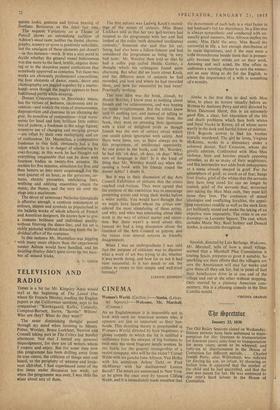The first subject was Ludwig Koch's record- ings of the
noises of animals. Miss Bruce Lockhart told us that her two lull-terriers had listened to the programme with her and had looked at the radio 'with detached intellectual curiosity.' Someone else said that his cat, Smog, had also been a fellow-listener and had considered the programme as being 'in very had taste.' Mr. Worslcy then told us that he had a collie pup called Hedda Gabler, a thought which his colleagues found quite charming. But what did we learn about Koch, and the different sorts of animals he had recorded, and how and where he had recorded them. and how far successful he had been? Practically nothing.
The next item was the book, Jinnah, by Hector Bolitho. I know next to nothing about Jinnah and his achievements, and was hoping for some enlightenment. But the critics knew next to nothing too, and instead of telling us what they had learnt about him from the hook, they went on stressing their. ignorance with a kind of delighted pride as though Jinnah was the sort of subject about which one could admit ignorance with safety. And there were hints, too, as there always are in this programme, of intellectual superiority. At one point in the book, said Mr. Worslcy, he had felt 'oh dear, oh dear, oh dear.' What sort of language is this? Is it the kind of thing that Mr. Worslcy would say when dis- cussing a book with his friends round the dinner table? I doubt it.
But it was in their discussion of the Arts Council Exhibition of pictures that the critics reached rock-bottom. They were agreed that the purpose of the exhibition was to encourage promising artists and bring their works before a wider public. You would have thought that we might have heard whom the critics con- sidered the most stimulating of these artists, and why, and what was interesting about their work in the way of subject matter and execu- tion. But there wasn't a word about this. Instead we had a long discussion about the function of the Arts Council as patron; and the voices rose several octaves in friendly disagreement.
When I was an undergraduate I was told that the purpose of criticism was to discover what a work of art was trying to do, whether it was worth doing, and how far or not it had been successful. is it too much to ask the critics to revert to this simple and well-tried formula?


































 Previous page
Previous page